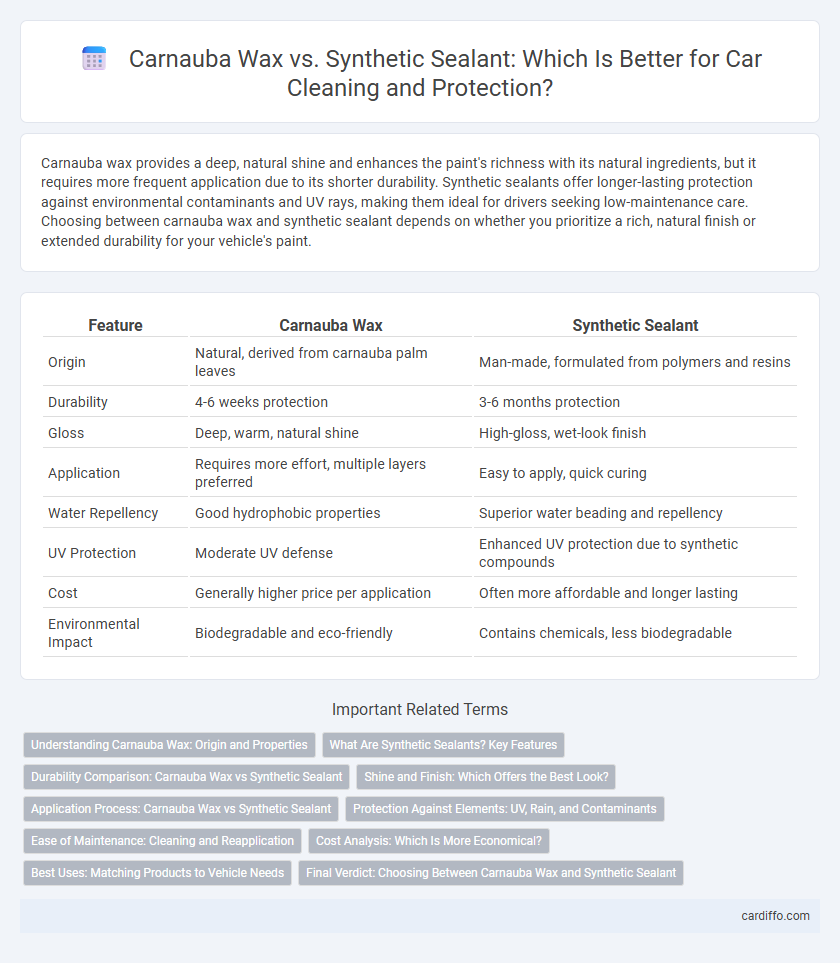Carnauba wax provides a deep, natural shine and enhances the paint's richness with its natural ingredients, but it requires more frequent application due to its shorter durability. Synthetic sealants offer longer-lasting protection against environmental contaminants and UV rays, making them ideal for drivers seeking low-maintenance care. Choosing between carnauba wax and synthetic sealant depends on whether you prioritize a rich, natural finish or extended durability for your vehicle's paint.
Table of Comparison
| Feature | Carnauba Wax | Synthetic Sealant |
|---|---|---|
| Origin | Natural, derived from carnauba palm leaves | Man-made, formulated from polymers and resins |
| Durability | 4-6 weeks protection | 3-6 months protection |
| Gloss | Deep, warm, natural shine | High-gloss, wet-look finish |
| Application | Requires more effort, multiple layers preferred | Easy to apply, quick curing |
| Water Repellency | Good hydrophobic properties | Superior water beading and repellency |
| UV Protection | Moderate UV defense | Enhanced UV protection due to synthetic compounds |
| Cost | Generally higher price per application | Often more affordable and longer lasting |
| Environmental Impact | Biodegradable and eco-friendly | Contains chemicals, less biodegradable |
Understanding Carnauba Wax: Origin and Properties
Carnauba wax, derived from the leaves of the Brazilian palm tree Copernicia prunifera, is renowned for its natural hardness and high melting point, which contribute to its exceptional durability and glossy finish on automotive surfaces. This natural wax forms a hydrophobic barrier that repels water and protects paintwork against environmental contaminants while enhancing color depth. Compared to synthetic sealants, carnauba offers a warmer, richer shine but typically requires more frequent reapplication due to its organic composition and susceptibility to UV degradation.
What Are Synthetic Sealants? Key Features
Synthetic sealants are advanced polymer-based products designed to provide a durable protective layer on vehicle surfaces, offering longer-lasting shine and resistance compared to natural waxes like carnauba. Key features include superior hydrophobic properties, enhanced UV protection, and increased resistance to environmental contaminants such as road salt and acid rain. Their synthetic composition ensures a faster application process and easier maintenance while delivering a sleek, glossy finish that typically lasts several months.
Durability Comparison: Carnauba Wax vs Synthetic Sealant
Carnauba wax offers a natural, glossy finish but typically lasts 4 to 6 weeks under regular conditions. Synthetic sealants provide superior durability, maintaining protection and shine for 3 to 6 months or more, depending on environmental exposure. The enhanced longevity of synthetic sealants makes them more suitable for extended protection against UV rays, contaminants, and weathering.
Shine and Finish: Which Offers the Best Look?
Carnauba wax provides a warm, natural shine with a deep, rich finish that enhances the paint's color and depth, making it ideal for show cars and classic vehicles. Synthetic sealants offer a high-gloss, reflective finish with longer-lasting protection against environmental contaminants and UV rays. For a mirror-like shine and durability, synthetic sealants generally outperform carnauba wax, though many enthusiasts prefer carnauba's more organic, subtle glow.
Application Process: Carnauba Wax vs Synthetic Sealant
Carnauba wax requires careful heating and softening before application, typically applied in thin, even layers and allowed to haze before buffing for a deep, natural shine. Synthetic sealants are easier to apply, often sprayed or spread on directly and can bond quickly with the paint surface for extended durability. The application process of synthetic sealants is generally faster and less labor-intensive compared to the detailed steps needed for carnauba wax.
Protection Against Elements: UV, Rain, and Contaminants
Carnauba wax offers natural protection against UV rays, rain, and contaminants by creating a hydrophobic barrier that repels water and reduces oxidation on car paint. Synthetic sealants provide longer-lasting defense with advanced polymers that form a resilient shield against harsh environmental elements and chemical contaminants. Regular application of either protects the vehicle's finish, but synthetic sealants typically deliver superior durability and enhanced resistance to UV degradation and acidic rain.
Ease of Maintenance: Cleaning and Reapplication
Carnauba wax requires more frequent reapplication and careful cleaning to maintain its protective sheen, as it naturally wears off faster than synthetic sealants. Synthetic sealants offer superior ease of maintenance by providing longer-lasting protection that requires less frequent cleaning and reapplication. The durability of synthetic sealants simplifies upkeep, making them ideal for vehicle owners seeking low-maintenance, long-term paint protection.
Cost Analysis: Which Is More Economical?
Carnauba wax typically costs between $15 to $30 per container, offering natural, rich gloss but requiring frequent reapplication every 4 to 6 weeks, leading to higher ongoing costs. Synthetic sealants range from $20 to $50 per bottle but provide longer-lasting protection, often up to 6 months, reducing the frequency and cost of maintenance over time. Evaluating long-term investment, synthetic sealants present a more economical option for vehicle owners seeking durable, cost-effective paint protection.
Best Uses: Matching Products to Vehicle Needs
Carnauba wax provides a deep, natural shine ideal for show cars and vehicles with darker paint, offering intense protection against UV rays and water spots. Synthetic sealants excel in durability and chemical resistance, making them perfect for daily drivers exposed to harsh weather and frequent washing. Choosing between carnauba wax and synthetic sealant depends on whether the priority is a glossy finish for aesthetics or long-lasting protection for everyday use.
Final Verdict: Choosing Between Carnauba Wax and Synthetic Sealant
Carnauba wax offers a rich, natural shine and deep protection ideal for show cars and classic vehicles, while synthetic sealants provide longer-lasting durability and superior resistance to environmental contaminants. For durability and ease of application, synthetic sealants are the preferred choice, maintaining surface protection for up to six months. Carnauba wax is best suited for enthusiasts seeking a high-gloss finish and a natural product, but those prioritizing lasting defense should opt for synthetic sealants.
carnauba wax vs synthetic sealant Infographic

 cardiffo.com
cardiffo.com